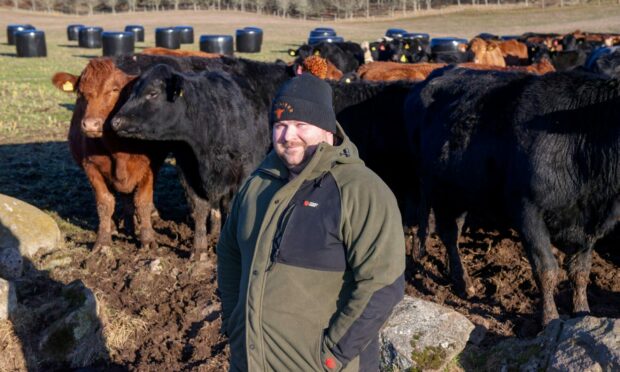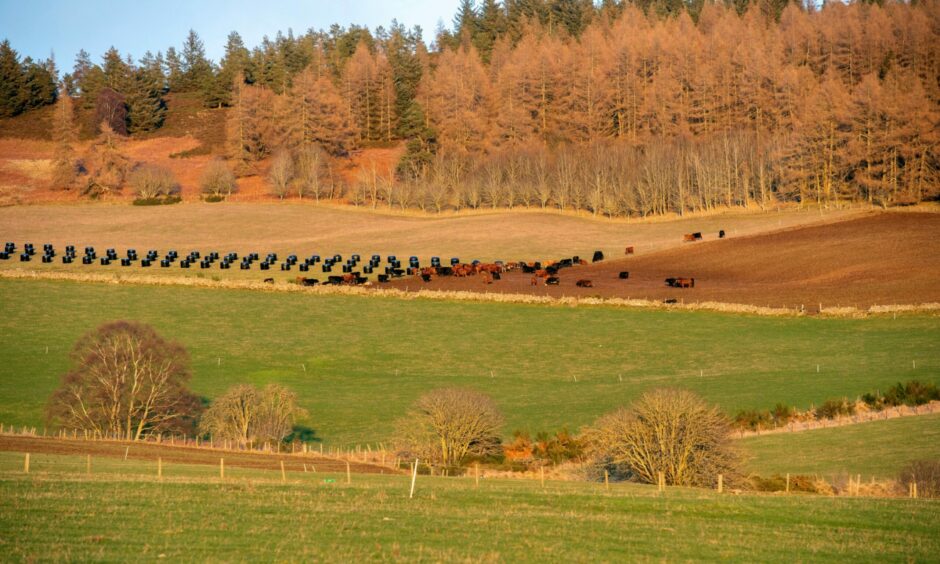More than 60 visitors turned out to the first meeting at Duncan and Claire Morrison’s Deeside Monitor Farm near Torphins, Banchory.
The young couple moved to the 226-acre unit Meikle Maldron in 2016 and now farm 558 acres in total with the addition of Duncan’s family farm at Upper Ingliston, Inverurie, and seasonal grazing at Womblehill, Kintore.
They have built up a spring calving herd to 220 head and hope to put 240 to the bull this year.
Aberdeen-Angus crosses, Stabilisers and pedigree Aberdeen-Angus make up the herd which includes 75 cows leased from another farmer with the aim of buying them overtime.
“The Aberdeen-Angus and Stabilisers suit the system here because they are low maintenance, hardy and can be outwintered all year round,” said Duncan.
“You can trust them to calve themselves and they manage it no bother outside in April. We use home-bred replacements and calve the heifers at two-years-old.
“The calving period is kept tight as bulls are only kept in for two cycles.”
Around 40% of the calves are sold through the store ring at Thainstone and the rest are either finished off grass or sold as forward stores.
Most Stabiliser bull calves are kept entire and sold deadweight to Scotbeef at 13 to 14 months. They generally kill out at 350kg to 370kg and realise £1,500.
Breeding heifers are sold privately at 12-14 months through the Stabiliser Cattle Company and the rest are sold store.
The pedigree Morrisons herd has been built up with good breeding lines and the couple are finally seeing returns with sales of bulls privately off farm.
“The breeds we are using are easy fleshing and can be kept on a grass based system so we don’t need to buy in creep feed or cereals,” said Duncan.
“We have invested time and money into rotational grazing and use clover mixed grass species so we don’t need to invest heavily in fertiliser. Around 37 acres of arable silage and 20 acres of kale is grown too.”
The kale is stripped grazed in the winter by the cows and the couple also work a bale grazing system where silage bales are placed in the fields and used when needed.
This allows Duncan to do a feed budget in the summer and avoids the use of machinery in the winter or time being wasted carting bales out to the field.
“A lot of money in farming is spent on machinery but I have invested the money in fencing, water troughs and splitting up fields accordingly for rotational grazing,” said Duncan.
“Generally, every breeding female is outwintered on the farm all year round, including the heifer calves we keep for replacements and the stock bulls.”
The couple recently invested in Romney cross Lleyn ewe lambs last year and have tupped them to the Lleyn.
They will lamb in April and the plan is to finish the lambs on grass and sell them direct to the slaughterhouse.
“I started out myself in farming and haven’t followed on from the previous generation so although I’ve taken my own direction, I am open to change and improving where I can to get the best out the farm,” concluded Duncan.
Visitors at the first meeting highlighted more than fifty points of positive practice at Meikle Maldron, including good cattle health, low-cost production, outwintering ease, handling and forage management.
Real-life experience and enthusiasm for livestock production encouraged attendees to suggest to Duncan and Claire that improvements could be made in data collection to drive the farm business forwards.
Bull fertility, improvements to soil structure, lime levels and the value of forage crops were discussed too.
The Monitor Farm programme is supporting a detailed soil analysis of several fields this spring, to provide the data and information needed to assess the farm’s soil health and allow targeted inputs for better grass and forage performance.

